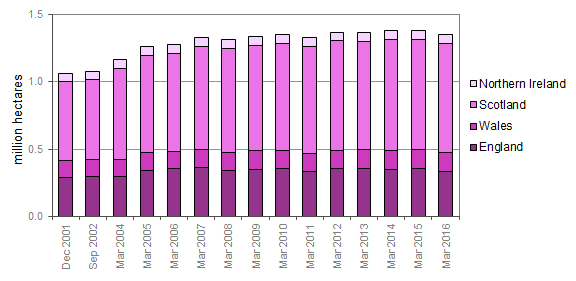Certified woodland in the UK has been independently audited against the UK Woodland Assurance Standard. Forestry certification schemes are owned by international non-governmental organisations and exist to promote good forest practice. They offer product labels to demonstrate that wood or wood products come from well-managed forests.
Figures for certified woodland areas are often used as an indicator of sustainable forest management. However, it should be noted that woodland that is not certified may also be managed sustainably.
Most changes to the certified woodland area figures over time are a result of new areas being certified or certificates not being renewed upon expiry. Temporary changes can also occur if there is a time lag between expiry and renewal.
1.35 million hectares of woodland in the UK were certified in March 2016 (Table 1.4). This represented 43% of the total UK woodland area, 26% in England, 46% in Wales, 56% in Scotland and 58% in Northern Ireland.
| Ownership | England | Wales | Scotland | Northern Ireland |
UK |
|---|---|---|---|---|---|
| thousand hectares | |||||
| FC/NRW/FS woodland1 | 215 | 117 | 471 | 62 | 864 |
| Private sector woodland2 | 123 | 24 | 336 | 3 | 486 |
| Total woodland area certified | 337 | 141 | 807 | 65 | 1 350 |
Source: Forest Stewardship Council, Forestry Commission, Natural Resources Wales, Forest Service, National Forest Inventory.
Notes:
1. FC: Forestry Commission (England and Scotland), NRW: Natural Resources Wales, FS: Forest Service (Northern Ireland). NRW estimates only relate to woodland formerly owned/managed by FC Wales.
2. Private sector: all other woodland. Includes woodland previously owned/managed by the Countryside Council for Wales and the Environment Agency in Wales, other publicly owned woodland (e.g. owned by local authorities) and privately owned woodland.
3. All certified woodland in 2016 is certified under the Forest Stewardship Council (FSC) scheme. Some of these woodlands are also certified under the Programme for the Endorsement of Forest Certification (PEFC) scheme.
4. The estimates are based on UK data published by FSC, supplemented by data from individual certificates and other sources. Where possible, figures are for the woodland area certified, rather than the land area certified.
5. All FC/NRW/FS woodland is certified. The FC/NRW/FS areas are the latest areas, as shown in Table 1.1, rather than the areas shown on the certificates.
Data: Longer time series of the above table are available from the Data Downloads webpage.
Figure 1.2 presents certified woodland area by country since December 2001, with figures for earlier years revised for consistency with results from the National Forest Inventory. This shows that, despite a decrease of 2% in the area of woodland certified between March 2015 and March 2016, there was an overall increase in certified woodland area of around 290 thousand hectares (27%) from December 2001 to March 2016.
Figure 1.2 Area of certified woodland, 2001-2016

Source: Forest Stewardship Council, Forestry Commission, Natural Resources Wales, Forest Service.
Notes:
1. All certified woodland is certified under the Forest Stewardship Council (FSC) scheme. Some of these woodlands are also certified under the Programme for the Endorsement of Forest Certification (PEFC) scheme.
2. The estimates are based on UK data published by FSC, supplemented by data from individual certificates and other sources. Where possible, figures are for the woodland area certified, rather than the land area certified.
Figures showing volumes of certified timber and Chain of Custody certificates are provided in tables 2.28 and 2.29.